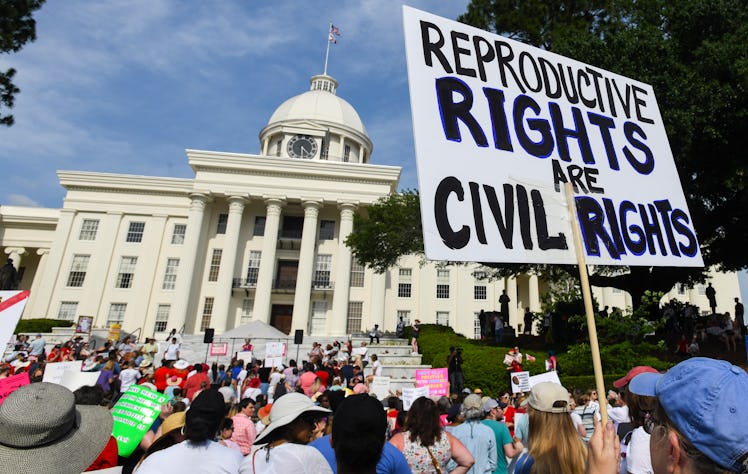
This Could Be The First State Without A Single Abortion Clinic
When it comes to reproductive justice and abortion access, the news isn't looking hopeful in Missouri. The state, which passed one of the most restrictive abortion bills in the country just two weeks ago, may be shutting down its last clinic that performs abortions. Missouri's abortion clinic closure could make it the first state without a single abortion clinic, leaving over one million people without access to the procedure.
In a statement on Tuesday, May 28, Planned Parenthood said that the Missouri Department of Health and Senior Services (DHSS) had refused to renew Planned Parenthood's license to perform abortions in the state. The Planned Parenthood health center in St. Louis, Missouri is the last remaining health center in the state that can still provide abortions, and unless its license is renewed, Missouri will no longer have an abortion clinic by the end of the week. The Missouri DHSS did not immediately respond to Elite Daily's request for comment.
To fight this, the statement said that Planned Parenthood would sue the state. Although the state recently passed a law restricting abortion access after eight weeks — before many people know they're pregnant — abortion is still technically legal in all 50 states thanks to Roe v. Wade, a 1973 Supreme Court case that granted pregnant people the right to choose whether to terminate a pregnancy.
In a statement, Dr. Leana Wen, the President & CEO of Planned Parenthood Federation of America, said:
This is not a drill. This is not a warning. This is a real public health crisis. This week, Missouri would be the first state in the country to go dark — without a health center that provides safe, legal abortion care. ... We want our patients to know that we will never abandon the women of Missouri. We will help you to get the care that you need — no matter what.
The news of the potential clinic closure comes shortly after Missouri Gov. Mike Parson signed a bill on May 24 outlawing abortions after eight weeks of pregnancy, including in cases of rape and incest. According to the law, any abortion provider that performs an abortion after the eight-week mark could be punished by 15 years in prison. Missouri now joins several states including Ohio, Kentucky, Mississippi, and Alabama in having the most restrictive rules around abortion in the country.
Even stricter than Missouri's eight-week ban is Alabama's near-total abortion ban that outlaws abortion in almost any case, including rape and incest, and only permits abortions if there's a serious health risk to the pregnant person. And unlike Missouri, where lawmakers have said they aren't necessarily looking to overturn Roe v. Wade, Alabama's Lieutenant Governor Will Ainsworth made it clear that the goal of the state is to directly challenge Roe v. Wade. In a statement calling Roe v. Wade a "46-year-old mistake," Ainsworth said:
It's important that we pass this statewide abortion ban legislation and begin a long overdue effort to directly challenge Roe v. Wade. ... Now that President Donald Trump has supercharged the effort to remake the federal court system by appointing conservative jurists who will strictly interpret the Constitution, I feel confident that the U.S. Supreme Court will overturn Roe and finally correct its 46-year-old mistake.
Planned Parenthood is already taking legal action to prevent Missouri's clinic closure, so stay tuned as everything unfolds.